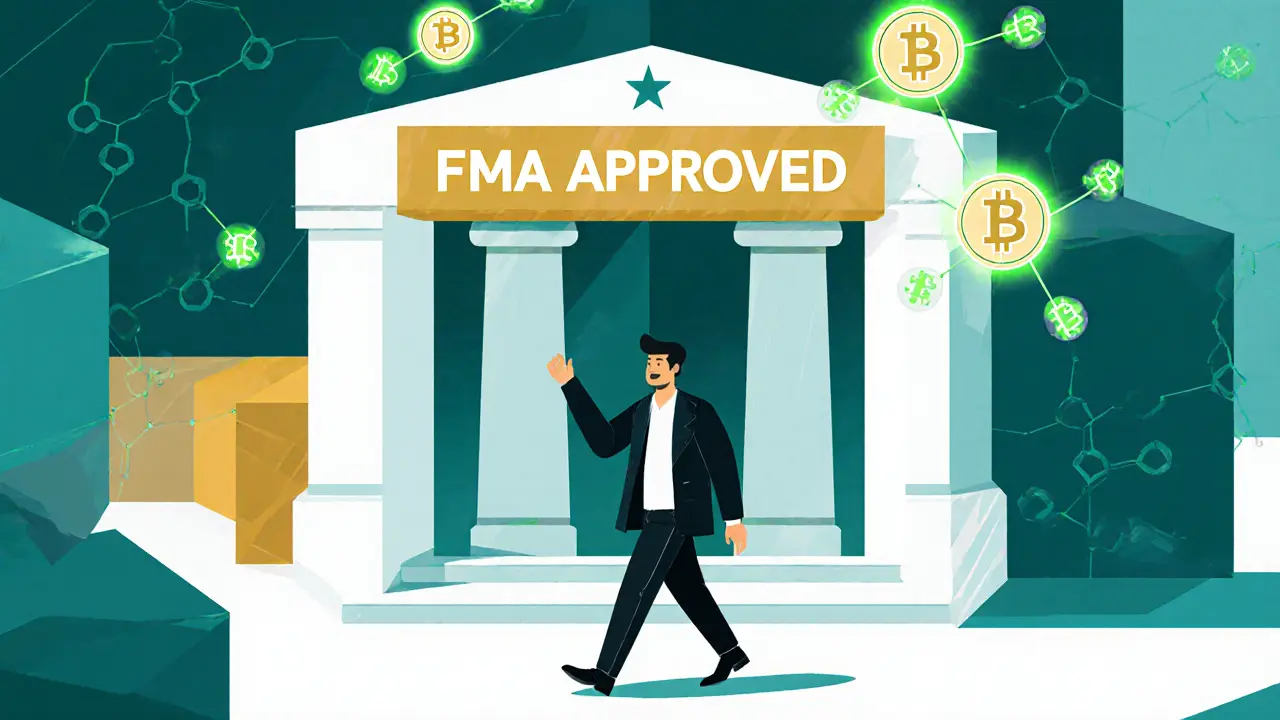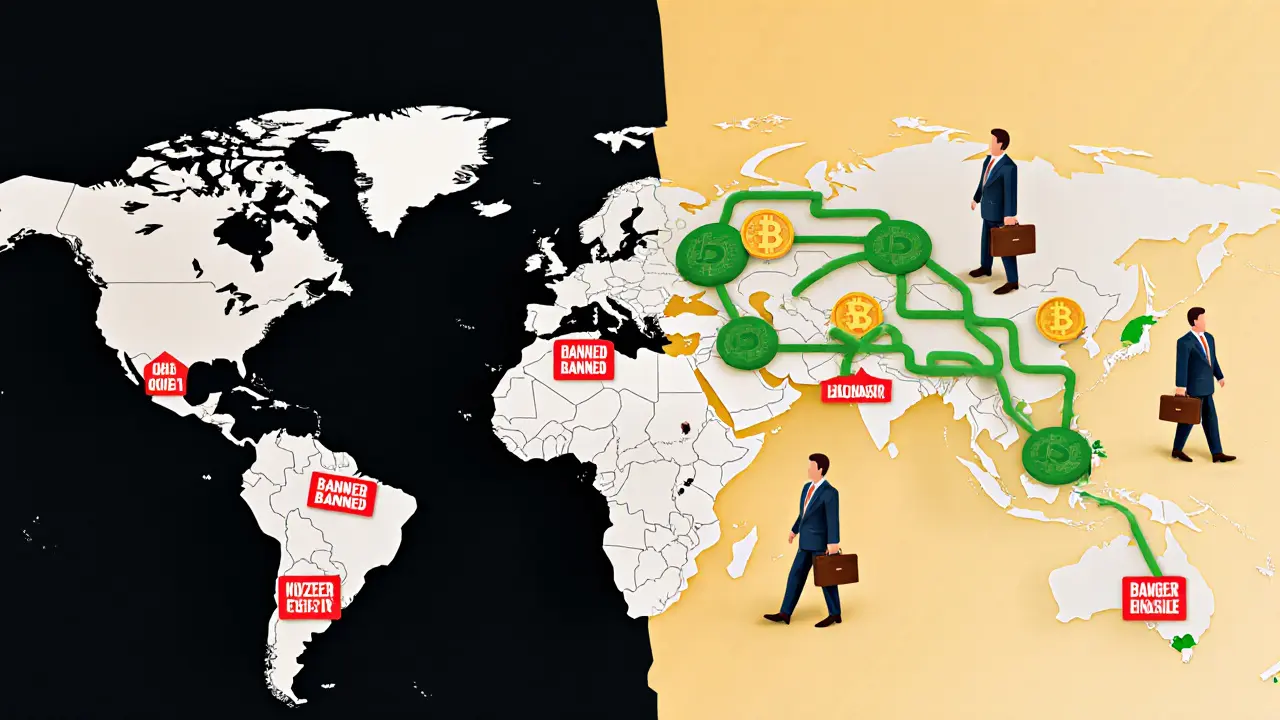Crypto Banking Access Checker
If you trade crypto, you know the biggest headache isn’t the market swings-it’s getting your money in and out of your bank account. You can buy Bitcoin, sell Ethereum, and track every trade, but if your bank freezes your account or refuses to open one, none of that matters. In 2025, your ability to bank as a crypto trader depends almost entirely on where you live. Some countries make it easy. Others make it impossible. And the rules are changing fast.
Where Banking Is Still Impossible for Crypto Traders
Nigeria is one of the worst cases. Since 2017, the Central Bank of Nigeria has banned all banks from handling crypto transactions. Even if you’ve never broken a law, your account gets shut down the moment a Binance transfer shows up. By 2025, over 97% of Nigerian crypto traders reported being blocked from traditional banking. Many are stuck using peer-to-peer platforms with 15-20% price premiums just to get cash. The government says it’s protecting financial stability, but the real result is pushing millions into risky, unregulated corners of the market.
Tanzania doesn’t ban crypto outright, but its central bank makes it clear: don’t expect help from banks. In their 2023 Financial Stability Report, they warned that the Tanzanian shilling is the only legal tender and that banks should avoid any crypto-related activity. The message is loud and clear-no banking, no support, no recourse.
Algeria and Egypt follow similar patterns. Both countries have no official crypto laws, but banks treat any crypto-related activity as suspicious. Traders report accounts closed without warning, documents ignored, and no way to appeal. In Egypt, 92% of traders surveyed in 2025 couldn’t open a business account, even with clean financial histories.
These countries aren’t just inconvenient-they’re actively hostile. There’s no licensing path, no gray area, no middle ground. If you trade crypto here, you’re on your own.
The Crypto-Friendly Countries That Actually Work
Then there are places where banking is built into the system. Liechtenstein leads the pack. Since 2020, its Blockchain Act guarantees that licensed crypto firms can open bank accounts. The Financial Market Authority (FMA) doesn’t just approve applications-they help you through them. Over 92% of licensed companies get banking access. The fee? $15,000-$25,000. The wait? Two weeks. The result? A thriving crypto hub with 147 blockchain companies operating legally and banking normally.
Switzerland isn’t far behind. With its clear rules from FINMA and a 800% risk-weighting approach (less strict than the global standard), 87% of crypto businesses secure banking. Swiss banks like Sygnum specialize in crypto, offering everything from custody to EUR/USD stablecoin conversions. You still need to prove AML compliance, but the path is defined, not hidden.
Germany is another standout. The Federal Financial Supervisory Authority (BaFin) classifies crypto as a financial instrument. That means banks can legally serve crypto traders-if they’re licensed. Over 68% of major German banks now offer crypto custody services. One trader in Berlin spent four months applying to 17 banks before landing an account with Solaris Bank. Now, he moves euros in and out of his crypto wallet with zero limits. It’s not easy, but it’s possible.
Malta, once called the “Blockchain Island,” still delivers. Its Virtual Financial Assets (VFA) Act requires a €35,000-€50,000 license, but 87% of licensed firms get banking access. Trust Bank Malta, a top choice for traders, has a 4.3/5 rating on Trustpilot with 327 reviews. Users praise the seamless stablecoin conversions-but note the €50,000 minimum balance requirement. It’s not for beginners, but it works.
Panama surprises many. No capital gains tax on crypto, a clear 2023 Digital Assets Law, and banks that actually respond to applications. 81% of registered crypto businesses here get banking access-higher than El Salvador, even though Bitcoin is legal tender there. Why? Because Panama’s regulators focus on compliance, not ideology.
Why Some Countries Say Yes and Others Say No
The difference isn’t random. It’s about how each country sees risk. Countries like Nigeria and Egypt fear losing control over their currency. They worry about capital flight, money laundering, or people bypassing the formal banking system. Their solution? Block everything.
But countries like Liechtenstein and Switzerland see crypto as a financial innovation they can regulate-and profit from. They don’t ban crypto. They license it. They don’t fear banks working with crypto firms. They require them to meet strict AML standards and then give them access. The result? More tax revenue, more jobs, more global business.
The big shift coming in 2026 is the Basel Committee’s new rules. They’ll force banks to hold 1,250% more capital against unbacked crypto assets-meaning most banks won’t be able to touch them. But not all countries will follow this strictly. Switzerland is already using 800%, and the UAE is allowing 800-1,000%. That’s the difference between staying open and shutting down.
Here’s the truth: the future of crypto banking isn’t about whether crypto is good or bad. It’s about whether a country wants to be part of the global financial system-or stay outside it.

What You Need to Get a Bank Account as a Crypto Trader
If you’re trying to open a bank account in a crypto-friendly country, here’s what you’ll need:
- Regulatory license (e.g., VFA in Malta, BaFin registration in Germany, DABA license in Bermuda)
- AML/CFT compliance documentation-proof you screen users, monitor transactions, and report suspicious activity
- Business plan showing how you’ll use the account, where your funds come from, and how you’ll stay compliant
- Legal support-78% of successful applicants hire a crypto-specialized lawyer. Fees range from $15,000 to $30,000
Common reasons for rejection? Incomplete AML files (47% of cases) and describing your business as “crypto trading” instead of “digital asset services” (29%). Banks don’t want to hear you’re a day trader. They want to see a structured, regulated business.
And don’t expect quick results. In the U.S., even with no federal ban, it can take 6-8 months. In Liechtenstein? Two weeks. The gap isn’t luck-it’s design.
What’s Coming in 2026 and Beyond
By early 2026, the Basel rules will be in full effect. Experts warn this will cut off 78% of current crypto participants from traditional banking. That doesn’t mean the end of crypto. It means the end of unregulated trading within the banking system.
Only licensed, compliant businesses will survive. The rest will either move to jurisdictions with flexible rules-or rely on crypto-native banks like Kraken Bank or Anchorage Digital. These institutions don’t need traditional banking relationships. They’re built on blockchain infrastructure.
For individual traders, this means two paths: either get licensed and compliant, or accept that you’ll always be outside the system. The days of hiding crypto activity under a personal bank account are ending. The banks are watching. The regulators are watching. And they’re not going back.

Where Should You Go If Banking Is Your Priority?
If you’re serious about trading crypto and need reliable banking, here’s the shortlist:
- Liechtenstein - Best access, fastest process, strongest legal protection
- Switzerland - Proven ecosystem, trusted banks, flexible rules
- Germany - Strong institutional support, BaFin clarity, Euro access
- Panama - Low tax, clear law, surprisingly good banking success
- Malta - Established framework, though expensive and minimum balances apply
Avoid countries with outright bans: Nigeria, Egypt, Algeria, Tanzania. Avoid countries with vague rules and no support: Seychelles, the Cayman Islands. You’ll waste time, money, and stress.
Banking access isn’t a luxury anymore. It’s the foundation. If you can’t move money in and out of your account, you’re not a trader-you’re a spectator.
Can I open a bank account as a crypto trader in the United States?
Yes, but it’s extremely difficult. There’s no federal ban, but state laws vary, and banks are terrified of crypto. The FDIC requires banks to hold 1,250% capital reserves for crypto-related deposits, making most banks refuse. Some crypto-friendly neobanks like Mercury or Silvergate (before its collapse) worked, but traditional banks like Chase or Bank of America rarely approve accounts for crypto traders. You’ll need a licensed business, full AML compliance, and likely a lawyer. Expect 6-8 months and multiple rejections before success.
Why do banks refuse crypto traders even if they’re legal?
Banks fear regulatory penalties, reputational damage, and the complexity of tracking crypto transactions. Even in countries where crypto is legal, banks don’t want to be the first to serve it. They worry about money laundering, sanctions violations, or future rule changes. Many don’t have the systems to monitor crypto flows properly. Unless a country forces banks to comply (like Liechtenstein), most will say no-even if the trader is clean.
Is it legal to use a personal bank account for crypto trading?
It’s risky. In many countries, banks monitor for crypto-related transactions. If they detect transfers to Binance, Kraken, or Coinbase, they may freeze your account, demand proof of source of funds, or close it outright-even if you’re just buying Bitcoin for yourself. In Nigeria, this is guaranteed. In Germany, it’s possible but less common if you’re a small trader. But as banks get better at detection, using a personal account for anything beyond small, occasional buys is no longer safe.
Can I move to another country just to get better banking access?
Yes, and many traders do. Countries like Portugal, Georgia, and Malta offer residency programs for digital nomads and crypto entrepreneurs. Portugal doesn’t tax crypto gains for non-habitual residents. Malta offers a VFA license that gives you banking rights. But you need to prove residency, tax compliance, and often a business plan. It’s not a quick fix-it’s a relocation with legal, financial, and personal costs. But for serious traders, it’s worth it.
What’s the difference between a crypto bank and a regular bank that accepts crypto?
A crypto bank (like Sygnum or Anchorage Digital) is built for crypto from the ground up. They handle custody, trading, lending, and fiat on/off ramps-all under one license. A regular bank that accepts crypto might let you hold USD or EUR, and maybe let you buy Bitcoin through a third-party partner, but they won’t give you direct access to your wallet or crypto-related business accounts. If you’re a trader running a business, you need a crypto bank. For casual users, a regular bank with a crypto partner might be enough.
Final Thought: Banking Access Is the New Border
The global crypto market isn’t divided by technology anymore. It’s divided by banks. Your wallet might be full, your trades might be smart, but without a bank, you’re cut off from the real economy. The countries that make banking easy are attracting talent, investment, and innovation. The ones that block it are watching their best traders leave-or go underground.
In 2025, your address isn’t just where you live. It’s your financial passport. Choose it wisely.

Angie McRoberts
November 6, 2025 AT 08:37Been there. Tried to open a business account in Texas with a crypto LLC. Got a polite email saying "we don't service high-risk industries." Meanwhile, my cousin in Zurich opened a Sygnum account in 10 days. The world is weird.
Also, why do banks act like crypto is a virus? They'll lend you millions to buy a yacht but freeze you for buying ETH.
Diana Smarandache
November 7, 2025 AT 03:27The systemic failure of Western financial institutions to adapt to technological evolution is not merely disappointing-it is economically catastrophic. The Basel Committee’s 1,250% capital requirement is a regulatory overreach masquerading as prudence. This is not risk management; it is institutional cowardice dressed in compliance jargon.
Allison Doumith
November 8, 2025 AT 21:45It's not about crypto it's about control
Every time a government bans crypto they're really saying I don't trust you with your own money
And the sad part? The people who get hurt the most aren't the traders
They're the ones trying to send money home to family
Or pay for medical bills
Or escape hyperinflation
They're the ones stuck paying 20% premiums on P2P
And no one's writing op-eds about them
Just about the banks losing "reputation"
Meanwhile the rich in Liechtenstein get tax breaks and private jets
And we're supposed to feel bad for the banks?
What kind of world are we living in
Scot Henry
November 10, 2025 AT 02:31Germany’s BaFin system is actually pretty solid. I know a guy who got approved after 5 months and 3 rejections. The key? He didn’t call himself a "trader." He called himself a "digital asset infrastructure consultant." Changed everything.
Also, lawyers are worth every penny. Don’t be cheap.
Sunidhi Arakere
November 11, 2025 AT 07:07In India, banks say crypto is illegal. But people still use it. Many use UPI to buy crypto through P2P. No bank account needed. It works. Simple. No paperwork. Just trust.
Becca Robins
November 12, 2025 AT 01:25so like... if i just buy $50 of btc every month on coinbase and cash out to my chase account... am i gonna get flagged? 😅
because i swear i've done this for 3 years and nothing happened
but now i'm scared bc everyone's like "banks are watching"
are they watching me??
Alexa Huffman
November 13, 2025 AT 13:09As someone who moved from California to Portugal last year-yes, relocating for crypto banking is real.
Portugal doesn’t tax crypto gains for non-habitual residents. The bank I opened with (Millennium BCP) asked for proof of residency, a notarized business plan, and my crypto transaction history. Took 6 weeks. No drama.
My advice? Don’t fight the system. Move to where it works for you. Life’s too short to argue with bank tellers.
Arjun Ullas
November 15, 2025 AT 03:09Let me be brutally honest: The United States is losing the crypto war. While Switzerland offers licensing pathways within weeks, American entrepreneurs spend years navigating bureaucratic quicksand. The Federal Reserve's fear-driven policies are not protecting the economy-they are exporting talent, innovation, and capital to nations with vision.
It is not a coincidence that the world’s most advanced crypto hubs are in Europe and Asia. The U.S. is becoming the digital-age equivalent of a declining industrial city-clinging to outdated rules while the future passes it by.
Steven Lam
November 15, 2025 AT 17:27why do people act like crypto is some kind of crime
it's just digital money
if you're not laundering or scamming then what's the problem
banks are just scared they'll get replaced
and they're right to be
they're dinosaurs with spreadsheets
and we're the future
get over it
Noah Roelofsn
November 16, 2025 AT 10:09Most people don’t realize that the real bottleneck isn’t regulation-it’s legacy tech.
Banks still use COBOL systems from the 1970s. They can’t track crypto flows because their software literally doesn’t understand blockchain addresses. No one’s training their fraud teams on how to spot a Binance withdrawal vs. a PayPal payment.
So when a trader walks in with clean records and a license, the bank doesn’t say "no" because of policy.
They say "no" because they have no idea what to do.
That’s why places like Liechtenstein win-they built their banking system from scratch with crypto in mind.
Sierra Rustami
November 16, 2025 AT 18:08Switzerland doesn’t deserve to be a crypto haven. It’s just rich and old and likes pretending it’s modern.
We should be building our own system. Not importing European bureaucracy.
America first. Crypto first. Banks last.
Glen Meyer
November 18, 2025 AT 08:54They banned crypto in Nigeria because they’re scared of losing control.
They banned it in Egypt because they’re scared of their own people.
And here in the U.S., they ban it because they’re scared of losing their fees.
Same fear. Different country. Same cowardice.
Missy Simpson
November 18, 2025 AT 10:35Just got my Sygnum account approved!! 🎉
Took 3 weeks, paid $20k in legal fees, had to submit 17 documents... but it WORKS.
I can now send USD to my crypto wallet like it's Venmo.
And yes, I cried when I saw the first transfer go through.
It’s not perfect. But it’s freedom.
Don’t give up. 💪
Tara R
November 19, 2025 AT 09:09The entire premise of this article is flawed. It assumes banking access is a right rather than a privilege extended by institutions that bear fiduciary responsibility.
When a bank chooses not to service high-risk entities, it is not an act of oppression-it is an act of prudence.
The notion that one’s financial freedom is contingent upon institutional accommodation is a dangerous delusion.
Perhaps the solution is not to demand access to the old system-but to build a new one.